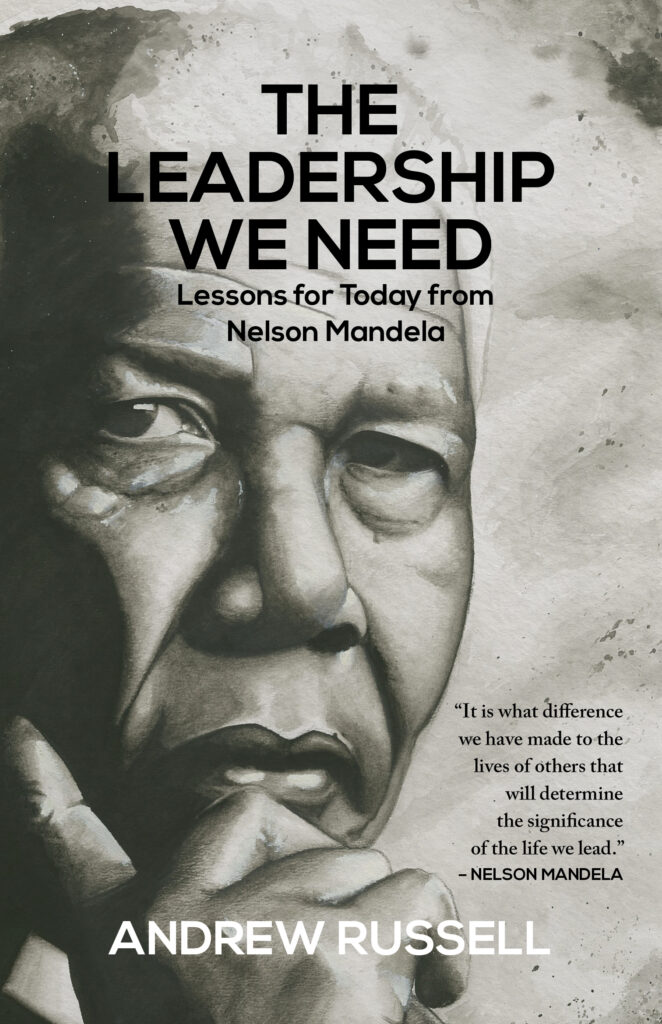When I was invited to talk at the 2024 Cape Town Humans Under Management conference, I chose to focus on three themes in Nelson Mandela’s life which are applicable to financial planners:
Overcoming challenges
Nelson Mandela faced numerous obstacles throughout his life, from systemic racism to 27 years of imprisonment. His approach to overcoming these challenges provides several lessons for financial planners:
1. Persistence and resilience.
Mandela’s unwavering commitment to his cause, despite decades of setbacks, exemplifies the importance of persistence. Mandela’s mental resilience during his 27-year imprisonment is legendary. He maintained hope and continued to develop his ideas despite isolation. Similarly, financial planners need to develop mental toughness to weather professional challenges, such as market downturns or difficult client situations. You also have the challenge of helping your clients build financial resilience through proper planning and risk management strategies.
What is certain is that markets fluctuate, policies change, and clients will face unexpected life events. Persistence in maintaining a long-term perspective and adhering to sound financial principles is crucial. Encouraging your clients to stay the course during market downturns or when facing financial setbacks demands resilience from both you and your clients.
2. Maintaining dignity and integrity.
Mandela always maintained his dignity and integrity, earning respect even from his guards. He never wavered from this path throughout his life – particularly when facing the greatest challenges. When financial planners face challenging market conditions or difficult client situations, you are required to always maintain your professional integrity. Uphold ethical standards and transparent practices, even when it might be easier to cut corners. This builds long-term trust and respect with clients and colleagues.
3. Building strong relationships.
Mandela was a master at fostering relationships with diverse groups, which proved crucial in negotiating a peaceful transition. Financial planners too need to cultivate strong relationships not just with your clients, but also with industry professionals, work colleagues and even regulatory bodies. These relationships can be invaluable when navigating complex financial situations or when you need to advocate for your clients’ interests.
4. Strategic thinking, long-term vision and patience.
Mandela’s approach to ending apartheid was strategic and patient, understanding that lasting change takes time. When he stood in the dock on 20 April 1964, he was prepared to take as long as it required to see his dream of a free and democratic South Africa come true. Financial planners need to help clients understand that significant financial goals often require time and a strategic approach. Your role is to encourage patience with long-term investment strategies and wealth building, and caution against impulsive financial decisions driven by immediate gratification and short-term market fluctuations. Just like Mandela, you have the challenge to help your clients think beyond their own lifetimes to how their financial decisions will impact future generations.
Gardening
During his 18 years of imprisonment on Robben Island and six years at Pollsmoor, Nelson Mandela found solace and purpose in gardening. In both prisons, he cultivated gardens, growing vegetables and flowers. These gardens became a source of nourishment for Mandela, his fellow prisoners and even his guards. Mandela’s love for gardening offers unlikely insights for financial planners.

1. Planning.
In gardening, one envisions a thriving landscape. Mandela pictured a united, democratic South Africa. A financial planner helps clients set clear monetary goals. All three require a well-defined end-state to guide decision-making. At first glance, planning a garden and Nelson Mandela’s planning for a post-apartheid South Africa may seem worlds apart. Yet, these two endeavours share surprising similarities in their approach and philosophy. Gardeners often plan for seasons beyond their own time. Mandela worked to establish enduring democratic institutions, and financial planners frequently help clients do sound estate planning.
2. Patience and nurturing.
Gardening requires patience and constant nurturing – qualities that are equally important in financial planning. Just as a garden doesn’t bloom overnight, financial goals often take time to achieve. Financial planners should cultivate patience in yourselves and your clients, understanding that wealth-building, like gardening, is a process that requires consistent care and attention over time. Like gardening, financial growth often occurs incrementally. A gardener provides water, sunlight and nutrients to plants. Mandela nurtured relationships, reconciliation and new democratic institutions to help his nation grow. So too must financial planners aim to help clients grow wealth. All three focus on creating conditions conducive to growth and development.
3. Adapting to different conditions.
Successful gardening requires adapting to changing seasons and environmental conditions. Similarly, as financial planners, you must help your clients navigate different life stages and economic climates. By understanding the “seasons” of financial life – from early career to saving to retirement – planners provide appropriate strategies for each phase. You help clients build financial resilience to withstand economic downturns and personal financial challenges. And just like Mandela grew a variety of plants in his gardens, so too must financial planners emphasise the importance of a diversified portfolio to mitigate risks and optimise growth.
4. Pruning and growth.
In gardening, pruning is essential for healthy growth. In financial planning, this principle applies to regularly reviewing and adjusting financial plans and investment portfolios. Clients may need to spend less to save more or cut underperforming assets and redirect resources to areas with greater potential. Like a skilled gardener, a good financial planner knows when to “prune” a financial plan to promote healthier growth.
5. Finding joy in the process.
Mandela found great joy and peace in gardening. Financial planners ideally will strive to help clients find similar satisfaction in their financial journey. By celebrating small incremental victories and helping clients connect their financial plans to their life goals and values, planners can make the financial planning process more engaging and rewarding and allow clients to find satisfaction in watching their wealth grow, celebrating milestones along the way. A well-tended financial plan can provide security and peace of mind for clients throughout their lives.
Nelson Mandela’s life offers profound lessons in overcoming challenges and changing lives that are deeply relevant to the practice of financial planning.
Changing lives
Mandela’s impact extended far beyond his own life, fundamentally changing South African society and inspiring millions worldwide. Financial planners, too, have the potential to profoundly impact clients’ lives for generations to come:
- Vision and long-term thinking. Mandela’s vision of a free and equal South Africa guided his actions over decades. Financial planners help clients develop a long-term vision for their financial future. This vision should guide all financial decisions, from daily budgeting to retirement planning. Key to the financial planner’s role is to encourage clients to think beyond immediate financial goals to consider their legacy and long-term impact.
- Empowerment through education. Mandela believed in the power of education to transform lives and societies. Financial planners educate clients about financial concepts and empower them to make informed decisions, they don’t just provide advice, but ensure clients understand the reasoning behind financial strategies. This approach builds trust and helps clients take ownership of their financial future. The financial landscape is constantly evolving, requiring financial planners to stay current with new financial products, tax laws and economic trends. Financial planners must help clients be prepared to adapt strategies to changing circumstances while maintaining core principles.
- Reconciliation and conflict resolution. Mandela’s approach to reconciliation after apartheid showcased his ability to bridge divides and find common ground. So too do financial planners need to develop skills in mediating financial conflicts, especially in family finance situations. The challenge is to help clients find balanced solutions that consider all stakeholders’ needs, particularly in estate planning or business succession scenarios.
Conclusion
Nelson Mandela’s life offers profound lessons in overcoming challenges and changing lives that are deeply relevant to the practice of financial planning. Remember, as a financial planner, you’re not just managing money, you’re helping to shape the financial future of individuals, families and potentially even communities. By drawing inspiration from Mandela’s legacy, you can approach this responsibility with the dedication, wisdom and transformative mindset it deserves.

Andrew Russell is the author of The Leadership We Need: Lessons for Today from Nelson Mandela and speaks both locally and internationally on this topic. More information is available at:













